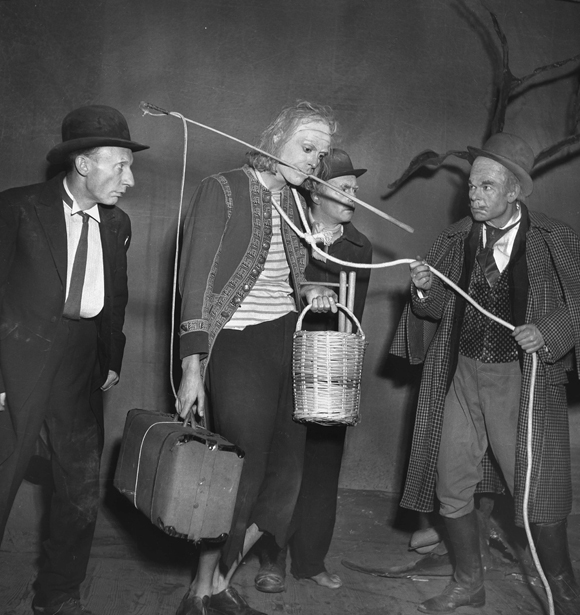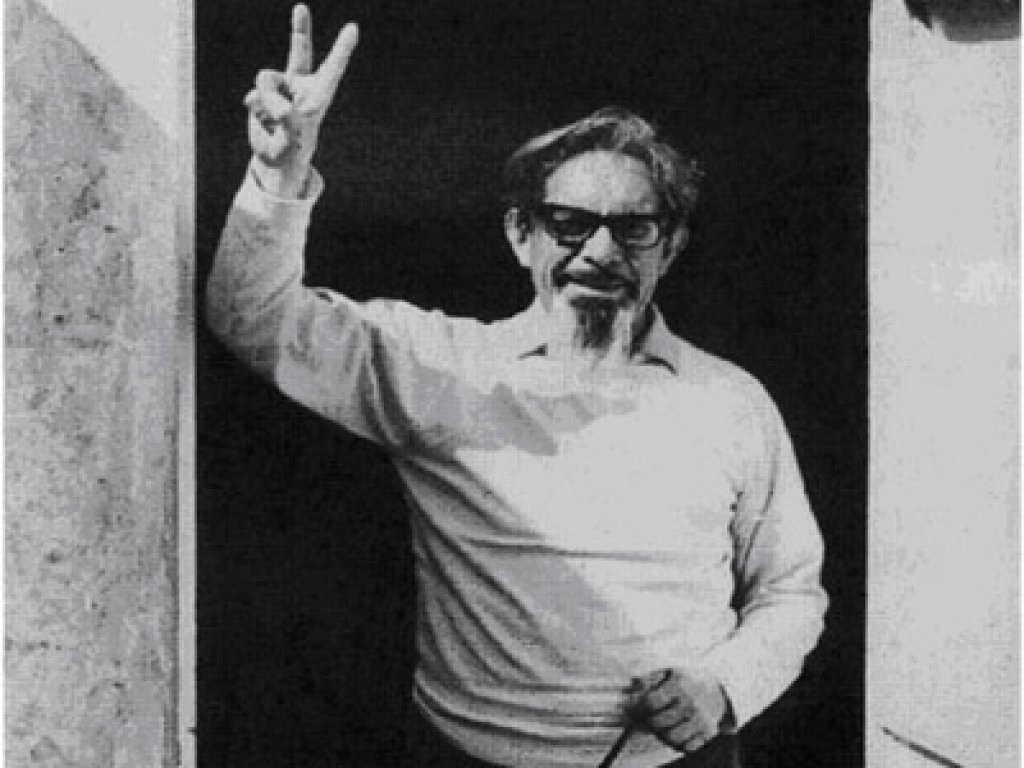The Hole by José Revueltas: Smuggling Hope
THE HOLE (EL APANDO) by José Revueltas, Tr. Amanda Hopkinson and Sophie Hughes. Oct. 2018. New Directions. 80 pp.
In 1957 a production of Samuel Beckett’s Waiting for Godot was staged in San Quentin State Prison, broadcast through the speaker system for the prisoners. Evidently, the play is banned reading material in Guantanamo. Interpretation of the play, in which two men wait (and cope with waiting) day-after-day for the coming of someone named Godot, has applications to the general human experience of dealing with the prospect of meaninglessness, but is especially resonant for those who are incarcerated, who are fully aware of how time is distorted in captivity. From post-Katrina New Orleans to apartheid South Africa and Israel-Palestine, Godot has been adapted to a variety of circumstances in which humans cling to hope amidst rising sentiments that they are powerless to affect change and lay ever in waiting for those who do have power to do something.
How often is it that hope is administered to the masses as an anesthetic, tacked on with a pricy co-pay, while forces that seem beyond control isolate the people from their power? It often seems to me that the only compelling argument for hope is that nihilism is fundamentally pointless and difficult--sure, “it all” may indeed be meaningless, so why not go along with the idea that “it all” does perhaps have meaning? What have we got to lose? This year, one issue of the popular socialist magazine Jacobin was dedicated to remembrance of the student movements and struggles of 1968, a year of worldwide collective organization and protest, viewed retrospectively in accordance with one’s perspective as either a blip or a catalyst. “And yet,” write the editors in their forward to the issue, “in the long run, all of these movements were defeated, with devastating consequences. Could another outcome have been possible? This question, which has been a source of controversy on the Left, is, of course, unanswerable.” The Left today attempts to muster up hope, because what point is there in believing that revolution as conceived pre-Cold War and pre-Internet is no longer feasible or that there is little left to do but wait for capitalism to burn itself out?
Mexican army troops escort demonstrators who were arrested during the Tlateloco protests which occurred on October 2nd, 1968. AP.
Following France’s pivotal student protests in May 1968 and ahead of the 1968 Olympics to be held in Mexico City, Marxist writer José Revueltas had hope for revolution and assisted in the organization of Mexico’s own student movement, a group mobilized toward the repeal of laws which criminalized protest and assembly and toward the end of police and military impunity. After increasing military occupation of Mexico City’s university campuses and attempts by the Mexican government to suppress the protests from the world’s Olympic gaze, roughly ten thousand students gathered at Plaza de las Tres Culturas on October 2nd, an event which culminated in a state-led mass shooting into the crowd and numerous arrests. Shortly after the event, referred to as the Tlateloco Massacre, Revueltas was arrested and held in the Lecumberri Penitentiary, where he was placed in solitary confinement out of concern that he would radicalize the younger prisoners. It was from this position that Revueltas penned and set his novella The Hole (El Apando) in the spring of 1969, forthcoming in English translation by Amanda Hopkinson and Sophie Hughes from New Directions.
The Hole anxiously anticipates the delivery of some respite, or deliverance from a pitiful institutional life, as three inmates held in Lecumberri await their visitors who come bearing smuggled heroin. Polonio, accompanied by his cohort Albino, hatched a scheme in which they convinced the mother of their loathsome, deformed cellmate The Prick to carry the dope through prison security in her cunt, figuring that on account of her age, maternity, and repulsive form, she would be exempt from the cavity searches-cum-fingerbanging regularly delivered to their hot girlfriends Meche and La Chata. The plot, which is packed into 56 pages in its entirety, is delivered as if its events are occurring in real-time as the book is read--time structure being a fairly meaningless idea considering how time is warped by monotony and anticipation. Like Godot’s Vladimir and Estragon, Revueltas’s three inmates are stuck waiting for their tiny escape from their pitiful existence, not entirely alive. The reader waits along with them, as time distorts in the way a good writer can force it to, molding it to the bends in time induced by repetition and violence. For the inmates, as with Vladimir and Estragon, the hopelessness of their outcome in life breaks them, their physicality and humanity also warped around a banged up idea of time.
Lecumberri Penitentiary
Given Beckett’s lifelong infatuation with the life of the prisoner and as Revueltas was an occasional playwright (though not particularly successful at it) himself, it is likely that Revueltas had read Beckett’s Waiting for Godot at some point, although no sources I have found have explicitly cited him as an influence. At the very least, the characters do map onto one another fairly neatly. Vladimir, the mental half of his pairing, to The Hole’s Polonio. Estragon, ever physical, to tattooed and sensual Albino. Pompous Pozzo, ultimately dependent on and captive to his slave Lucky, is little more than the apelike guards, more captive to the institution thany any inmate for they do not know that they too are caged. The slave Lucky, who Beckett seems to imply is ultimately freer than the other characters of Waiting for Godot because he expects nothing but his present state of slavery, however, is too idyllic a prisoner to map conveniently to the pathetic grovel of The Prick.
Movie poster from the 1976 film adaptation.
In both works, there exists a pervasive exploration of the captor-captive dichotomy, the idea that the captor is less free than the captive because the captor does not realize he is not free. Revueltas does extend this concept a step further, projecting this captivity narrative onto mother and son archetypes. Polonio and Albino would love to see The Prick dead, his emasculated helplessness a nuisance that would be his death sentence if he were not redeemed by his mother’s ability to serve a role in their scheme. For this reason, he is still attached to his mother, the cord never having been entirely severed--and, come to think of it, isn’t the rope which ties Lucky to Pozzo rather umbilical as well? Beloved edgelord Camille Paglia wrote in “Sex, Art, and American Culture” that, “Every man must define his identity against his mother. If he does not, he just falls back into her and is swallowed up.” The Prick does not receive the sexualization given to every other named character. He is little more than a neutered dog, driven by instinct, denied archetypal cock and his humanity. Were he to possess conscious motivation, he might be able to fully sever his connection to his mother, that tie which defines his impotence and gives him his utility in Polonio and Albino’s scheme, thus securing his survival.
That the scheme is dependent on both The Prick’s mother’s unsnipped connection to her son and her symbolic pregnancy and birth of dope enabled Revueltas to explore how the captor-captive dichotomy might be applied to the concept of maternity. For the term of a pregnancy and its definition as a fetus, a fetus is confined to the womb. It is by nature an entity solely on account of its confines, and so is unconcerned that it is confined. Revueltas’s archetypal mother, however, is captive to her parasitic fetus. She is not structurally confined, so does not realize her captivity, that her identity is dependent on her parasite. The power of The Prick’s mother is seemingly based in The Prick’s impotence. His survival as a parasite seemingly depends on her toxic placenta. Such a mother is not unlike a penal institution, in which the incarcerated seek to escape their captivity and in which it is in the interest of the state to keep the incarcerated within its womb. What use is breast milk once the babes are weaned?
Production photograph from 1953 premiere of Waiting for Godot, Théâtre de Babylone, Paris.
The idea that the freedom of the captor is illusory is easily decontextualized into the interpretation that it is better to be a victim than an oppressor, and by extension, that one should aspire toward and embody victimhood. Vladimir and Estragon invent for themselves a form of “play” in which they pretend to be Lucky, envious perhaps that he has a source of direction, or at the very least, an explanation for his existence. The Christian notion that it is easier for a camel to pass through the eye of a needle than a rich man to attain salvation has historically been used by monarchies to coerce the masses into accepting their serfdom. The opposing tendencies to declare slavery as a mentality and to adopt identities of victimhood are two sides of the same coin--the implication being that in spite of what physical hierarchies do exist, their effects may be eluded through tricks of the tongue and mind.
Contortions of the mind such as these surely have psychological implications, whether to regain a feeling of control or to exacerbate a feeling of not having control, but, regardless of their psychological effects on individuals, do little in the way of alleviating disenfranchisement. When there is little evidence that the waiting for change will end, and both mental tricks and direct action seem to be of no avail, it seems that the next logical course of action is to make the best of the hole. Go nuts, fuck, get fucked up, entertain yourself, whatever makes the waiting time go by faster. It is entirely possible that no matter what actions we take or how aware we are of our situation that it is not enough to change it. But then again, why not pass the time by entertaining ourselves with the possibility that what we do does in fact matter? Hope, at least, might be easier to smuggle.
José Revueltas
Katherine Beaman






